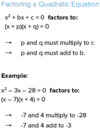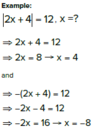Algebra Flashcards
x = 3y - 2
10 - 2x = 8 - 3y
Solve for x and y using Substitution
We substitute the right side of the 1st equation in for “x” in the 2nd equation.
Make sure to use Parenthesis when doing substitution!
10 - 2(3y - 2) = 8 - 3y
10 - 6y + 4 = 8 - 3y
14 = 8 + 3y
6 = 3y
y = 2
Plug y = 2 back into 1st equation, to solve for x: x = 3(2) - 2 = 4
What is a Quadratic Equation?
What is the General Form of a Quadratic Equation?
How would we put x2 - 3x = 2 into General Form, so we can factor it?
A Quadratic equation means that the variable is taken to the 2nd power.
Quadratics often have 2 solutions! Watch out– don’t assume only 1 solution!
The General Form is ax2 + bx + c = 0, where a, b, and c are constants
Subtract 2 from both sides:
x2 - 3x - 2 = 0

Factor x2 - 3x - 28 = 0

Solve by factoring:
x2 - x - 12 = 0
(x - 4) (x + 3) = 0
x = 4 or x = -3
To check, we can use FOIL:
F = First = x*x = x2
O = Outer = x*3 = 3x
I = Inner = -4x
Outer + Inner combines to = 3x - 4x = -x
L= Last = -4*3 = -12
Solve by factoring:
x2 + 10x = 0
Factor out an “x” from each term:
x(x + 10) = 0
x = 0 or (x + 10) = 0
x = 0 or -10
x2 = 25
x = ?
x = 5 OR -5
Remember to look for 2 solutions on Quadratics!

x2 = 2x
This is a “Disguised Quadratic”. It looks different from the General Form. However, it should be manipulated, factored, and solved as a Quadratic (which often gives 2 solutions).
x2 - 2x = 0
x(x - 2) = 0
x = 2 or 0
Common Error (we only get one solution. We miss the x=0 solution):
Divide both sides by x: x = 2
This is similar to the following error: x2 = 16, square root both sides, x = 4
OR, x = -4


Factor x2 - y2
This is very common on GMAT. What do we call it?
Difference between Squares:
x2 - y2 = (x + y) (x - y)
Factor:
4x2 - 25
Difference between Squares:
(2x + 5) (2x - 5)
Factor:
16x4 - 9y2
Difference between Squares:
(4x2 + 3y) (4x2 - 3y)
Factor x2 + 2xy + y2
1: “Difference Between Squares”: x2 - y2 = (x + y) (x - y)
(x + y) (x + y) = (x + y)2
This results in only 1 solution, since it’s a perfect square.
These 3 Special Products are very common:
Factor x2 - 2xy + y2
1: “Difference Between Squares”: x2 - y2 = (x + y) (x - y)
(x - y) (x - y) = (x - y)2
This results in only 1 solution, since it’s a perfect square.
These 3 Special Products are very common:
Solve by factoring:
x2 + 9 = -6x
Add 6x to both sides: x2 + 6x + 9 = 0
(x + 3) (x + 3) = 0
Can also be written as (x+3)2 = 0
x = -3
Only 1 solution, because it’s a perfect square
Factor: a2b2 + ab = 2
Then, find b in terms of a
First, subtract 2 from both sides:
a2b2 + ab - 2 = 0
(ab + 2) (ab - 1) = 0
To check, we can FOIL:
F: ab*ab = a2b2
OI: ab* -1 + ab*2 = ab
L: 2*-1 = -2
To find b in terms of a: (ab+2) = 0 OR (ab - 1) =0
(ab+2) = 0, ab = -2, so b = -2/a OR
(ab - 1) = 0, ab = 1, so b = 1/a
What is |-10| ?
10
It turns a negative value into a positive.
Absolute value also means “distance from 0” on a number line.
| is the absolute value symbol.
|x| = 4
What is x?
x = 4 or -4


Data Sufficiency:
What is the value of x + 2y ?
(1) x + y = 2
(2) 6x + 12y - 3 = 15
(1) is Insufficient.
(2) is Sufficient.
We don’t always have to know both variables individually, when the question is asking for a combined value.
Watch out for the “C Trap”: when we think we need both statements, but one statement is sufficient.
We can manipulate (2), so that the left side is the same as the question:
Add 3 on both sides: 6x + 12y = 18
Divide by 6 on both sides: x + 2y = 3



What is 4 squared?
4 squared = 42 = 4 * 4 = 16
4 is the base. 2 is the power.
For a power of 2, we use the word “squared”.
(This is because a square with 4 units on each side has an area of 42)

What is 2 cubed?
2 cubed = 2 * 2 * 2 = 23 = 8
For a power of 3, we use the word “cubed”.
(This is because a cube with 2 units on each side has an area of 23)





What “Perfect Square” less than 100 has 5 as a prime factor?
25 = 52
a Perfect Square is the square of an integer
For a perfect square, the prime factors have even exponents:
Examples: 36 = 22 * 32
100 = 22 * 52
What “Perfect Cube” less than 100 has 3 as a prime factor?
33 = 27
a Perfect Cube is the cube of an integer
For a perfect cube, the prime factors have powers that are a multiple of 3.
Example: 1728 = 26 * 33 = (2*2*3)3 = 123
23 * 24 = 2?
Multiplying Like Bases:
23 * 24 = 27
Add the powers:
xa * xb = xa+b


What is 0.33, as a fraction?

xy-2 * x3y+5 = x?
xy-2 * x3y+5 = x4y+3
Multiplying Like Bases: add the powers
xa * xb = xa+b
(x2)3 = x?
(x2)3 = x6
Power to a Power Rule:
(x<span>a</span>)<span>b</span> = xab
a) What is x-1 ?
b) What is 2-3 ?
A negative exponent is the Reciprocal of the positive exponent:
(1 divided by the positive exponent)

a) Express using a negative exponent
b) Express using a positive exponent


If x-1 = 5, what is x?


Square Root is the inverse of Squaring.













0a = ?
0
0 to any power is 0.
1a = ?
1
1 to any power is 1
Is 0.43 > 0.42 ?
Why or why not?
No.
A fraction between 0 and 1 gets SMALLER as the power increases.
- 43 = 64/1000 = .064
- 42 = 16/100 = .16
Is -(1/2)3 > -1/2 ?
Yes.
A positive fraction between 0 and 1, taken to greater power, gets closer to 0, and therefore smaller.
A negative fraction between -1 and 0, taken to an odd power,
is still negative and gets closer to 0, and therefore greater.
(-1/2)3 = -1/8
-1/8 > -1/2
is a/b > (a/b)2 ?
(1) a < b
(2) a and b are positive
1) Insufficient. If a = 1 and b = 2, 1/2 > 1/4 –> Yes
If a = -1 and b=2, -1/2 < 1/4 –> No
(Note that a positive fraction between 0 and 1 gets smaller when raised to a higher power, but also we have to account for the possibility of a negative number)
2) Insufficient. If a = 1 and b = 2, 1/2 > 1/4 –> Yes
If a = 2 and b = 1, 2 No
Together: Sufficient. (2) rules out the negative number possibility that made (1) Insufficient
Positive or negative?
a. (-1)5 ?
b. (-2)3
c. -32 ?
d. -3*(-4)7 ?
a. Negative. A negative number taken to an odd power is negative.
b. Negative.
c. Negative. Without the parentheses, we have to take the exponent first, before the - sign.
So, 32 = 9, and -32 = -9
d. Positive. (-4)7 is negative, so -3*(-4)7 is positive


